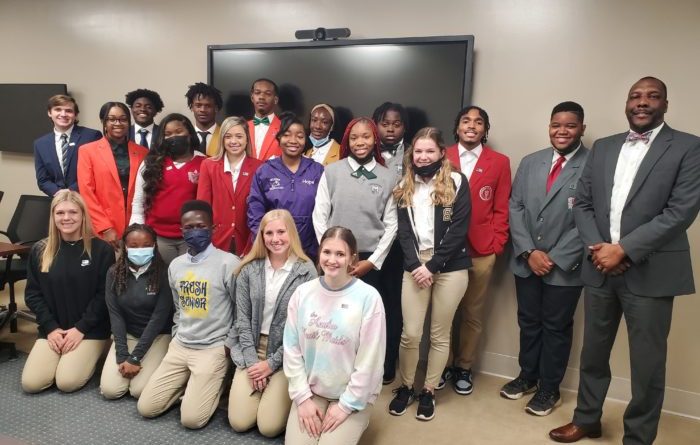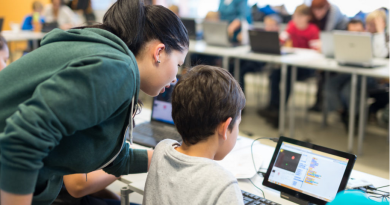3 superintendents to watch: How they’re ensuring education is student-centered
Increasing the capacity of its school leaders, expanding academic programming and nurturing positive school climates have been driving forces behind the improvements in these three districts.
It was old-fashioned technology that got instruction to students when COVID shut down Mobile County Public Schools in 2020. Though the district, Alabama’s largest, got devices and Wi-Fi hotspots to all students, the families living in more rural areas remained completely cut off from the internet. So, master teachers filmed lessons in the district’s studio for two local TV stations to broadcast on a regular schedule, Superintendent Chresal Threadgill says.
The classes were also available on YouTube. “Districts from different states reached out and asked permission to use our channel,” says Threadgill, Alabama’s 2022 superintendent of the year. “That was huge for us to showcase our teachers and for them to teach not only our kids but kids throughout the U.S.”
The pandemic has also motivated Threadgill and his team to partner with utility companies to cover the entire district with Wi-Fi, a service that will be available to all residents. “Improving the reputation and perception of public education is a huge thing for me,” he says. “Public education gets beat up a lot so it’s very important for us to have a positive outlook.”
Mobile County’s efforts are an example of how District Administration‘s next round of “Superintendents to Watch” are placing students at the center of instruction.
Changing mindsets to change outcomes
Back in 2018 when Threadgill took over in Mobile County, he was faced with raising the district’s state report grade from its long-held C. When asked how he and his team raised that grade to a B, his first answer has nothing to do with curriculum, technology or even professional development. “We started from the top—we had to change the mindset and hold everyone accountable, including myself,” Threadgill says. “I had to make sure we got the right people in the right spots for the right reasons.”
The district employs about 8,000 educators and staff. One of Threadgill’s first moves as superintendent was “starting over” by restructuring and streamlining the central office. Some of its employees were shifted to school sites while new administrators with more multidimensional skills were moved in. “We hired fewer people and produced more work,” he says.
When he and his team began working on academics, they made the district’s curriculum uniform across its 90 schools and shifted from a block schedule to more traditional periods in high schools. To continue recruiting high-quality teachers, the district is offering signing bonuses of $3,000 to $5,000 and holding regular job fairs. “In the past, low-performing teachers were put in low-performing schools—that doesn’t make sense,” he says. “You need a teacher who understands the school and the environment and is going to pull the best out of the kids.”
He also created an in-house leadership academy shortly before the pandemic to support administrators in taking larger roles and to help master teachers move into administration. It has served the district well as a grow-your-own pipeline of talent, he says.
Threadgill’s vision for top-notch personnel extends to hiring staff who are also equity-minded. “You can say equity and give a student the same books and the same laptop but none of that matters if you don’t have a person in the building who cares about the child and understands where that child comes from and understands the disadvantages and deficiencies the child has.”
‘Find a way to say yes’
Students in Collier County Public Schools in South Florida have also been making steady and substantial gains in academic achievement and graduation rates in recent years. Increasing the capacity of its school leaders, expanding academic programming, and nurturing positive school climates have been driving forces behind the improvements, Superintendent Kamela Patton says.
A process called “Data Dialogues” lies at the heart of this work. During these structured conversations, central office administrators and school leadership teams analyze a wealth of student data points, such as results from the district’s own assessments, state exam scores, attendance and discipline. The conclusions drawn have led to changes in instructional materials and professional development, among other adjustments. “It is a venue to share areas that need improvement and celebrate successes,” says Patton, Florida’s 2022 superintendent of the year. “This school-centric approach is a way to empower school leaders to engage with student data and target gaps.”
Over the last decade, engineering and entrepreneurship classes have been added to every middle and high school while the rigorous Cambridge curriculum is available in every grade. Educators have also targeted their efforts toward specific subgroups, such as by providing extra programming and support staff for migrant students. The district’s Learning Express travels to communities to bring special instruction to migrant families. And students with disabilities will have a dedicated wing for programming in a new high school the district is building. The district also has an internal hiring initiative for older students who age out of special education.

Superintendent Kamela Patton guest teaches students at Calusa Park Elementary School in Collier County Public Schools in South Florida.
The graduation rate for migrant students has climbed from 54% in 2012 to 88.9% in 2020 while the rate for students with disabilities has improved from 48% in 2012 to 83.5% in 2020. The overall graduation rate has improved from 72.5% in 21011 to 92.7% today, says Patton, who originally moved to Florida from Pennsylvania to work for Barry Gibb, of the musical group the Bee Gees. She went on two tours with Gibb.
A major focus for Patton and her team is preparing students for college, career, and life. Collier County’s “Connect for Success” initiative guides students in developing competencies such as self-efficacy, grit, self-discipline, organization, time management, and leadership. Students participate in these “Connect for Success” activities twice a week. Middle and high school students remain in cohorts with the same teacher to strengthen relationships and community.
One of the biggest challenges in the coming years will be the shortage of high-quality teachers, as fewer students across the nation are going into education. In Florida, more than 50% of new teachers are certified through alternative programs. “These alternative certification teachers often have strong content knowledge but need substantial training in pedagogy, classroom management and student development,” she says. “Like in other school districts, we now must take on the task of training new teachers to deliver instruction with no additional funding or support.”
Patton hopes expanding the teacher talent pool will become a national priority. Collier County’s wide range of retention programs includes its own alternative certification program, which is free to teachers. It also provides teachers with mentors, coaching, and leadership pipelines.
Leading a school district after more than two years of a pandemic requires listening to the concerns of—and responding to—internal and external stakeholders. “My personal philosophy that all my cabinet members know is, ‘Find a way to say yes,’” Patton says. “I know it is not possible to say yes to everyone or everything, but when possible, find a compromise, say yes to some part of the request—find a way to say yes particularly if it impacts, benefits, and enriches the lives of students.”
Establishing student-centered leadership
Educators in the Palisades School District in Pennsylvania blend student-centered leadership and customized learning by helping them match their interests for college and career to course content. Students in the small system can select a career pathway in fields such as health, business, arts, and engineering, along with 22 other options at the district’s technical high school. Students also helped develop the district’s comprehensive plan and serve on teacher and coach interview committees, Superintendent Bridget O’Connell says.
On the equity front, O’Connell and her team in recent years have been working to expand access to AP classes and minimize the summer academic requirements that may inadvertently disadvantage students who work over the summer. The district has also changed the types of courses that count for class rank. Grades earned in college courses, which require students to pay tuition and find transportation to the college campus, are no longer calculated. Only courses taught at the high school count toward students’ GPAs.

Superintendent Bridget O’Connell reads to students in the Palisades School District in Pennsylvania.
O’Connell is also involved in advocating for schools with the state legislature. She says the state government was supportive in helping the district maintain in-person instruction throughout the 2020-21 school years. Grants enabled Palisades to hire additional teachers for virtual instruction, purchase cleaning products, and plexiglass, store furniture and other fixtures to accommodate social distancing, and provide free meals to students during the pandemic and beyond.
Of most concern to the district is the $2.3 million (more than 4% of its total budget) spent on students who attend cyber charter schools. The district has been advocating for a lowered, flat fee to better manage its budget and alleviate additional taxpayer burden. “As an educational leader, it is important to appraise our legislators as to what we see day in and day out in our schools and community,” says O’Connell, Pennsylvania’s 2022 superintendent of the year.
In the coming years, budgets and dwindling enrollment will present the biggest challenges as the district anticipates embarking on another strategic planning process in the fall. “Our students’ performance and high levels of achievement continue to be the focus and direction of our staff moving forward and our budget reflects that commitment,” she says. “However, charter school costs and rising pension costs put a strain on our resources.”
She is also concerned about the pressures on the pipeline into teaching, administration, and the superintendency. The district has created an education career pathway at its high school for aspiring teachers. “Being a superintendent is a challenging job, but it is extremely rewarding,” O’Connell says. “In my everyday interactions, I strive to show that I enjoy the work that I do as superintendent to support students and the community so that aspiring leaders will pursue this position.”
Source: https://districtadministration.com/3-superintendents-to-watch-ensure-student-centered-education/






